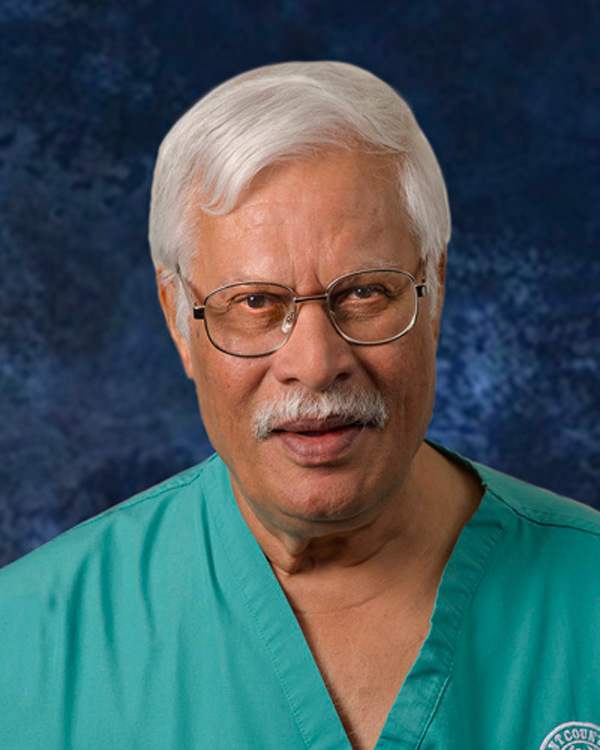Five days after we published a story about disgraced former Tarrant County medical examiner Nizam Peerwani (“Examining the Evidence,” Mar. 3), an anonymous letter full of accusations about him landed in our office. The sender, going by the name Johnny Hacker, left a nonexistent return address and no documentation to support his claims, but we were able to verify several accusations, either through subsequent open records requests or past reporting.
Enclosed were two typed pages packed with intimate details about the inner workings of Tarrant County’s ME office, which is staffed by seven board-certified forensic pathologists who identify the cause of death in homicide cases, unattended deaths, and other situations where the reasons for the demise are unknown.
“Somebody needs to help with the Tarrant County coroner’s office,” the letter opens. “Dr. [Peerwani] is out of control, and things are falling apart. We can’t complain when he does something wrong. Peerwani is really getting senile, and he makes mistakes all the time.”
In the early March story that piqued Johnny Hacker’s interest, we examined government documents tied to Peerwani and found that he may have practiced medicine without a license early in his career before working as an appointed judge — the judicial title afforded to medical examiners by Texas’ Code of Criminal Procedures — even though he was not a U.S. citizen, contrary to rules set by Texas’ constitution. Our research that was aided by veteran watchdog David Fisher delved decades into the past to examine Peerwani’s documented pattern of skirting state law, but Johnny Hacker described more recent allegations against the ME who retired late last year.
The Star-Telegram recently reported that a California family is suing the Tarrant County medical examiner’s office because an employee shipped the wrong body from Tarrant County to the Golden State in 2020. Family members of Jose Gonzalez, according to the article, were horrified to see a stranger’s body in their loved one’s casket. Such incidents, the whistleblower alleges, were commonplace under Peerwani.
“They released at least two bodies to the wrong families, and one was cremated,” part of the letter reads, possibly referring to the event that led to the recent lawsuit. The whistleblower alleges that Peerwani, to cover for mistaken cremations, frequently falsified cremation request forms from funeral home directors.
Whistleblower Hacker alleges that Peerwani’s daughter used her position at the Tarrant County District Attorney’s office to help and protect her father. ME Peerwani, who was born in Pakistan, frequently invited female students from the Middle East to study at the county’s crime lab, Hacker alleges. On at least one occasion, Hacker claims, the ME used his daughter’s position to prevent visiting students from being prosecuted for shoplifting.
In trying to untangle the family connection, our open records requests found that daughter Sarah Peerwani interned at the ME office in mid-2004. She then worked for the DA’s office between 2011 and 2014. One of two referrals for the DA gig came from current Tarrant County DA Sharen Wilson, who worked as a county criminal court judge in 2011.
In our March story, Fisher alleged that the DA’s office has a history of covering up criminal acts by Peerwani over the course of the ME’s 42-year career. In 1996, based on one Star-Telegram article, assistant district attorneys blocked the release of ME office salaries that would reveal the ME’s exorbitant earnings from the county and surrounding counties that contracted with the Tarrant County Medical Examiner’s office. By the end of his career, our reporting found that ME Peerwani earned around $3 million a year through his various contacts with surrounding counties.
In the letter, whistleblower Hacker notes that Peerwani’s staffers worked for him and not the county — something our recent investigation found to be true. Based on Peerwani’s government contracts approved by the DA’s office, Tarrant County leaders paid his professional association — in this case, an incorporated business partnership — rather than Peerwani. That arrangement supported by county leadership for decades violates the Texas Code of Criminal Procedure that mandates all MEs to be an appointed person, not a company.
“All the doctors work for Peerwani and not county employees,” the letter reads. “How is this not a conflict of interest? He pays them. They do what he says no matter what. We can’t complain when he does something wrong.”
Whistleblower Hacker further alleges that Peerwani falsified autopsy records related to the 2019 police shooting of JaQuavion Slaton. Based on a Star-Telegram article from the time, several police officers surrounded assault suspect Slaton, a young Black man held up inside his vehicle. Slaton suffered seven gunshot wounds, including six fired by three officers, according to media reports at the time.
“There is no evidence to suggest that [one self-inflicted] shot was fired from a police weapon,” Peerwani said in a statement at the time, meaning he believed it was a suicide when a suicide finding would insulate Fort Worth police from repercussion.
The whistleblower alleges that Deputy Medical Examiner Dr. Marc Krouse ruled Slaton’s death a homicide but that Peerwani changed the ruling to suicide.
In a system where MEs are paid by the same county officials who fund district attorney offices, there’s an inherent conflict of interest that may pressure MEs across the Lone Star State to falsify evidence in favor of county prosecutors, who subsist on guilty pleas.
Last year, a Tarrant County district judge found that Peerwani gave false testimony in a 2006 murder case that sent one man to death row, where he remains to this day. The case involved Tilon Lashon Carter, who was convicted for the murder of 89-year-old James Tomlin. Prosecutors relied heavily on Peerwani’s testimony. The ME testified that Tomlin suffocated but failed to disclose that the victim had a pacemaker.
Pulling favors for prosecutors is apparently a thing in Tarrant County, according to whistleblower Hacker.
“The doctors have a meeting every other Wednesday, and sometimes they disagree on how to make a ruling on a homicide case,” Hacker alleges. “Sometimes, a doctor or two don’t want to call it a homicide, but [Peerwani] makes them do it anyway. But he never tells anybody that.”
An internal audit of the Tarrant County medical examiner’s office in 2020, which was spurred by demands from local defense attorneys, found 59 errors in 27 cases.
“The number of bad autopsies [performed under Peerwani’s stewardship] is easily in the thousands, but they were not mistakes,” watchdog Fisher told us. “This was a business built on providing various customers — DAs, federal prisons — what they wanted in the way of autopsy findings.”
Whistleblower Hacker alleges that Peerwani would lie about equipment being broken to be able to order new X-ray machines, diagnostic tools, and medical supplies that he would use for personal business. Our open records requests found several large orders for X-ray equipment by Peerwani over the past several years, but tying a specific order to Hacker’s letter is not possible because the written accusations do not have specific dates.
Peerwani “has taken on cases from Lubbock County to make more money,” reads another whistleblower allegation that we verified.
Peerwani’s current agreement with Lubbock County, based on county documents, afforded a 60% profit share with the remainder going to Tarrant County. Monthly payments to Peerwani’s professional association from that county range from $40,000 to $50,000, according to Lubbock County documents.
“The morgue is a mess because toxicology samples have got mixed up,” the letter reads. “DNA samples have got mixed up. Histology samples have been mixed up. They released at least two bodies to the wrong families. Peerwani had it covered up and even tried to write a fake cremation request.”
The early-December appointment of Peerwani’s replacement, Dr. Kendall Crowns, continues the county’s history of skirting state laws. Crowns’ appointment may be invalid because Peerwani was still the acting ME when Crowns was sworn in. In September, the Tarrant County Commissioners Court extended Peerwani’s contract through Dec. 31, 2021. This agreement approved by the DA’s office would invalidate any official who tried to take the oath of office before Jan. 1, 2022.
The oft-cited Crawford v. Saunders established the precedent that elected officials in Texas cannot appoint a judicial officer if there is no vacancy in the office. The 1894 ruling by the Texas Court of Civil Appeals ruled that county commissioners in Frio County could not appoint a justice of the peace to replace the JP who fled the state. Two officers cannot hold the same office at the same time, the court ruled.
Crowns was not more eligible to assume the position of county ME than Joe Biden would have been to take on the presidency prior to Jan. 1, 2021. Because of that blunder on the part of county leaders, every decision made by Crowns since early December may be null and void.
Law enforcement across the state has been reluctant to prosecute scofflaw MEs, but the recent arrest of two Nueces County medical examiners shows how quickly MEs can stack up felony charges. In April, Nueces County’s chief medical examiner, Dr. Adel Shaker, and former chief deputy medical examiner, Dr. Sandra Lyden, were arrested when law enforcement learned that Shaker hired Lyden knowing she didn’t have a proper medical license. Shaker faces multiple third-degree felony charges while Lyden has been charged with 15 counts of medical malpractice.
Although ME prosecutions remain exceedingly rare in Texas, the recent arrests in Nueces County may signify a new trend in which medical examiners are no longer allowed to operate free from scrutiny and accountability.
Hacker’s letter closes with a desperate plea for help.
“Why won’t anyone investigate him?” they write. “Please, please help. He is a crook, and no one outside of this office will believe us.”
This column reflects the opinions of the editorial board and not the Fort Worth Weekly. To submit a column, please email Editor Anthony Mariani at Anthony@FWWeekly.com. Submissions will be edited for factuality, clarity, and concision.













We need help from the Texas Rangers and Texas Attorney General. This is an embarrassment that needs addressing.
It is beyond time that people recognize the fact that government agencies and public officials have no interest in transparency and accountability when it comes to the institutional malfeasance and criminality committed by dishonest derelict public officials. The Rangers might investigate but the crime has to be prosecuted by a State attorney and tried in a court by a lawyer who is an elected judge. So at every stage in the process a state actor is in control.
Until every citizen starts voting and petitioning grievances nothing is going to change. We need to stop eating the cake.
This is such terrible journalism. How am I as the reader supposed to just blindly trust one David Fisher’s findings? Click bait at its finest.
Suzanne. You are not supposed to blindly trust anything. David Fisher provided several hundred pages of government documents on Dr. Peerwani. Tell your friend Dr. Peerwani that I will gladly go over my reporting on him, but he will need to answer a list of questions that I have.
Best,
Eddie
Just had another incident last week that should be investigated. The Tarrant County ME ruled the death of Alex Velmure a suicide. I am just rising the red flag about this incident because it seems the law enforcement agencies involved are not releasing any information describing the actions of the police officers involved in this incident. The suicide did happen at n the context of a law enforcement encounter in which it has been reported on social media comments that witnesses observed the police conducting a PIT maneuver on Velmure’s vehicle causing it to crash into center divider. The comments also claim that the officers charged the disabled vehicle with weapons drawn and aimed at the driver. But there is no official information being provided about whether the police discharged their weapons during the incident.
He is very shady man we rented his home in Arlington and he never returned my 10k deposit. He repainted the entire home and then sold it